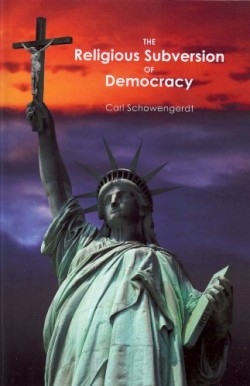
The Religious Subversion of Democracy
“Onward Nazi soldiers, onward Christian soldiers, onward Marxist soldiers, onward Marxists and Muslims, onward every chosen People, every Crusader and Holy War-maker. Onward into misery, into wickedness, into death!”
—Island, Aldous Huxley
There is no doubt that the increasing frequency of new scientific discoveries and technological innovations made during this century will affect and define mankind’s role in the future. As humanity reaches out to colonize outer space, harvest vital organs from the tissue of mice, and develop medications to increase our life spans by decades, we still maintain what some would argue is an antiquated ethical system. Recent generations have made achievements that our ancestors would have never dreamed possible, but our progress is still grounded in the quagmire of creation myths thousands of years old.
Carl Schowengerdt’s book, The Religious Subversion of Democracy, illustrates this with clarity. He writes, “It is so important to manage our myths, put them in their place…If we do not appreciate that they are myths, and allow them to rule our lives…the result, so far in our human experience, has been intolerance and destruction.” About ethics, Schowengerdt further writes, “Ethics, we guess, should govern the actions of all persons everywhere…generally they are, in our judgment, what are necessary for the human species to survive…ethics vary considerably from one situation to another according to who at that time has the power of control.”
The Religious Subversion of Democracy will anger many people who may consider it an attack on their faith. Others may find that their doubts and misgivings about religious myths are voiced here, and that making personal and governmental decisions based on the instructions of a “Supreme Being” is ludicrous. Schowengerdt’s book provides an outlet for those who fear persecution or cannot express in words how silly and perplexing religious myths seem. The author has no problem with people who have faith in their own personal god and who follow a moral code. It doesn’t matter if one believes that they go to a “better place” after they die. Religious faith, like a child’s belief in Santa Claus, has a rightful place when it teaches a simple moral lesson and provides comfort and reassurance. Most religions, though, are highly intolerant of one another. Schowengerdt shows us that throughout history, right up to the present, people and cultures have been wiped out because of religious intolerance. Fanatics who kill in the name of their faith are dangerous to all life. Before our dogmatic belief in religious myths destroys our potential to evolve as a species, we need to, as Buckminster Fuller said, “Release humanity from the false fixations of yesterday.” Schowengerdt’s book is instrumental in taking those steps toward the betterment of mankind.
Schowengerdt is a practicing family physician with a background as a thoracic surgeon. He grew up in a very religious family. His father was a Methodist minister and Schowengerdt has a brother who is a Methodist Bishop. The two biggest influences in his life have been “religion and medical science.”
Disclosure: This article is not an endorsement, but a review. The publisher of this book provided free copies of the book and paid a small fee to have their book reviewed by a professional reviewer. Foreword Reviews and Clarion Reviews make no guarantee that the publisher will receive a positive review. Foreword Magazine, Inc. is disclosing this in accordance with the Federal Trade Commission’s 16 CFR, Part 255.
